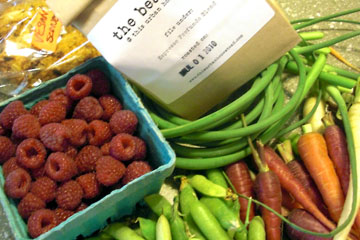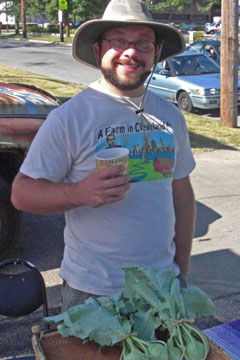JULY 3, 2010
Small steps
 I bought this wonderful food at the farmer's market this morning: locally grown veggies, coffee roasted not far from my house, and home-made zucchini muffins.
I bought this wonderful food at the farmer's market this morning: locally grown veggies, coffee roasted not far from my house, and home-made zucchini muffins.
Walking home I wrested with a question that's been bothering me: if Americans change our ways, stop buying cheap plastic crap from Walmart, ride our bikes so we don't need more big cars, and in general consume less, what then?
What will the former Walmart workers do? The auto workers who are laid off? The truck drivers, salespeople and McDonald's cooks who aren't needed anymore?
Like it or not, an awful lot of Americans earn a living because of our excessive consumption of inferior food and products. If we cut our consumption dramatically, where will these Americans work? How will they support their families?
A sustainable economy
I believe that we should buy fewer things, drive fewer miles, and focus on quality rather than quantity, but I'm concerned about the ripple effect this will have throughout our society. What would a more sustainable American economy look like?
If we reject George W. Bush's advice to "Go shopping more," what will we do?
My visit this morning to the Gordon Square Farmers' Market gave a few hints, perhaps. Most of the dozen or so merchants grow their vegetables right in the city. There's a guy who roasts coffee a pound at a time in his home, the ultimate micro-roastery.
 Another, Justin Husher, is developing what he calls a "micro-scale farm" within spitting distance of the highway.
Another, Justin Husher, is developing what he calls a "micro-scale farm" within spitting distance of the highway.
None of these people will become success stories by the standards of the old economic model. Roasting coffee a pound at a time won't make you a millionaire, and even the biggest urban "farm" is tiny by comparison to a real farm. But maybe the new economy will be based on many very small businesses run by people who want to earn a living, not make a killing.
I've noticed that many small stores and restaurants in Europe and the Bahamas appear to survive on relatively few customers. A tiny specialty food store in a Swiss village closed for the day because the entire family was in the field harvesting wheat (by hand).
One restaurant on Eleuthra, one of Bahamas out-islands, had no menu. You ate whatever the owner made that day. Another had no regular hours. If you wanted to eat you had to call in advance.
It seems that in other parts of the world business owners are OK with just paying the bills rather than becoming the biggest cheese store or cafe in town.
Will it work here?
If we spend less money on cheap plastic crap made in China, we can spend more on good local food and products made by craftspeople. Or is it hopelessly naive to think that we will trade quantity for quality? I've already heard good, progressive friends complaining about the high prices at the farmers' market. It's going to be hard to break our expectations of cheap food.
I try to live by the advice of my food guru, Michael Pollan:
Americans spend, on average, less than 10 percent of their income on food, down from 24 percent in 1947, and less than the citizens of any other nation. And those of us who can afford to eat well should. Paying more for food well grown in good soils — whether certified organic or not — will contribute not only to your health (by reducing exposure to pesticides) but also to the health of others who might not themselves be able to afford that sort of food: the people who grow it and the people who live downstream, and downwind, of the farms where it is grown.
Unhappy Meals, New York Times, January 2007.
What's your vision for a healthier American economy? What is sustainable? Do you think we can make this change? Please add your comments below.
Top |
|
![]()
